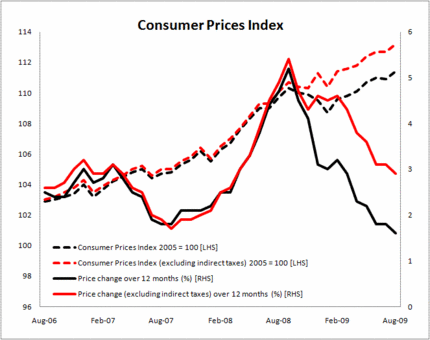Is this deflation I see before me? Why prices are rising faster than the inflation rate
I am not sure about you, but I sometimes have to go to the back numbers to make sense of the statistics that get thrown at me.
I have been for some months a bit curious as to why the brightest brains (well some seriously well paid experts) among the UK economists have consistently been wrong in their prediction of inflation, each time overstating the fall in the headline figure.
Again this month, they expected the Consumer Price Index to fall to 1.4% in August, according to the regular consensus poll of economists undertaken by Reuters. The actual figure recorded by the Office of National statistics was 1.6%.
This underestimation of inflations now seems to be a regular event each month. This suggests that the economists polled are on average of the view that the economy is under greater deflationary pressure than is actually the case.
So I looked at the back data and the components that make up the CPI and was a bit baffled as to why this view should be so deeply ingrained.

Here’s a graph of CPI showing the year to year comparison that we get headlines written about and the actual month-by-month trend in the index. I have also plotted VAT, the index with the effects of indirect taxes removed. And you can see the point of departure when VAT was reduced.
What is clear is that in the wake of Lehman Brothers collapse there was a deflationary period, which saw the price index fall for the four months October 2008 to January 2009. We all remember the pre-Christmas sales.
But since January prices have risen according to the index by about 2.5%. Hardly deflation. Since January the only month that has seen prices fall was July, and a fall in prices in July is not unusual.
So we are seeing prices rise far sharper than the inflation rate suggests, with the recent monthly inflation rate far higher than the headline annual change figure suggests.
And as the reference point for the headline rate moves into the deflationary period of October 2008 to January 2009, we should expect to see a sharp rise in CPI, unless that is we are heading for a corresponding period of deflation.
Just to speculate wildly and play with the numbers, even if prices stood still from now to next January the inflation rate would rise to 2.5%. And, if they rise in the remainder of the year as fast as in the year to date, by December Mervyn King might be close to putting pen to paper.
And no doubt those who see inflation as a threat will point to the recent rise in RPIY, which is the retail prices index mix of goods and services with the mortgage payments and indirect tax volatility taken out. Having reached a low of 1.9% in June this index has risen to 2.1% in July and 2.3% in August.
So perhaps we should be getting a wee bit more concerned about inflation than we have been.
Well maybe, but clearly when you are developing policy to address any risk you look at both the chances of an event happening and also the scale of the consequences if that event should happen.
Deflation presents rather nastier problems for the economy than a slight excess over inflation. So you give it a much wider berth on the grounds that if you overdo the remedy you can sort out the mess of too much inflation more easily.
There is of course a long way to go before we have a clear picture of whether the beast of deflation has been defeated, there are a huge number of variables and time lags that influence the one number – 1.6% – that we are presented with when inflation is described.
But there are two things to bear in mind in my view.
Firstly, what happened last year is not always the best reference point, particularly if it was a freak period.
Secondly, the consequence of winning the battle over deflation might be a rather sharper rise in inflation than the Bank of England would like. So we should at least prepare ourselves for rather higher interest rates than we as borrowers might like.